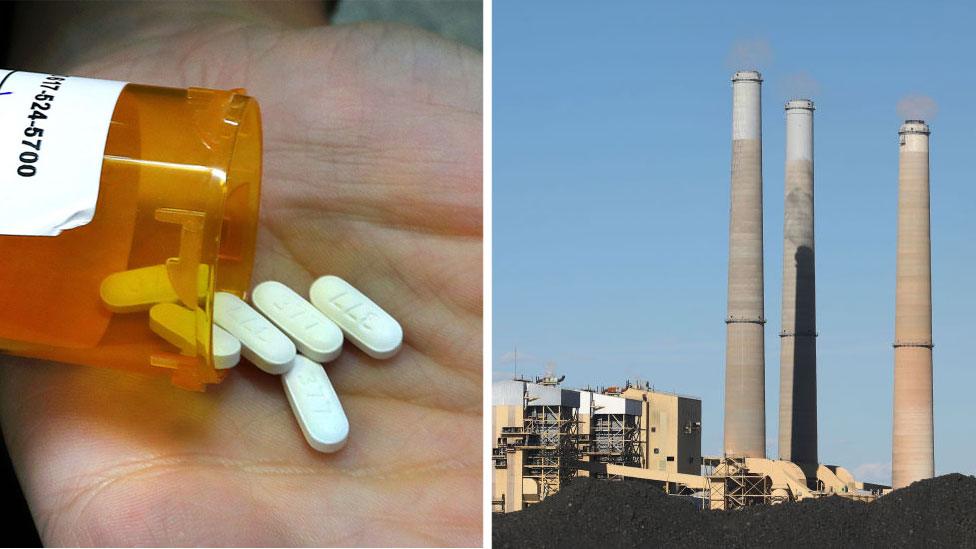Democrats draw battle lines in Iowa
- Published
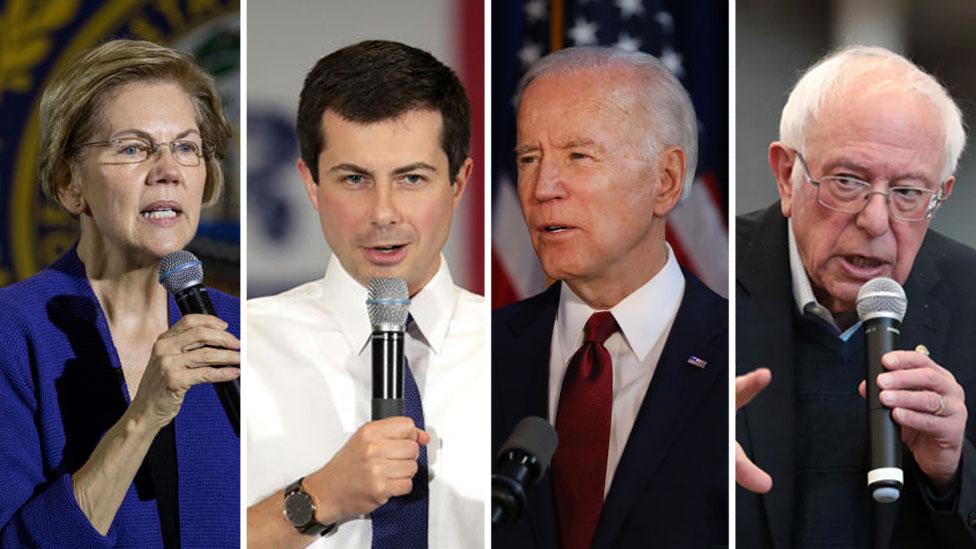
The current frontrunners (left to right): Elizabeth Warren, Pete Buttigieg, Joe Biden and Bernie Sanders
In three weeks, Iowa Democrats will begin the party's process for selecting a nominee to take on Donald Trump in the general election. And tonight they host a high-stakes debate. After more than a year of campaigning, it's almost time for actual voters to begin weighing in - and the race is still wide open.
Lil and Jarad Bernstein stood at the edge of the crowd gathered near the stage after a Pete Buttigieg rally in Des Moines on Sunday.
They were two of the several hundred who had turned out on a snowy evening to hear the former South Bend, Indiana mayor speak, but unlike many of the attendees - who came sporting campaign T-shirts, buttons and hats - they were not entirely sold on him yet.
"I like all of the candidates," Lil said. "I'm really just looking for someone who can win the nomination and ultimately beat Trump in the election."
"Electability" is an attribute that comes up time and time again here in Iowa and across the US. Surveys indicate, external that more than half of Democratic voters believe, like Lil, that the party should pick the candidate most likely to beat Trump. Winning, in their view, is the top priority. But the big question is which candidate is best positioned to do it - and why.
The bold and the practical
Both Lil and Jared Bernstein said they were considering Buttigieg because he seemed like a candidate with realistic proposals. Jared added Minnesota Senator Amy Klobuchar and former Vice-President Joe Biden to the list of "practical" candidates he could end up backing.
But what about two of the other top candidates in the field, Senators Elizabeth Warren and Bernie Sanders?
"Bold is great, but you have to be able to implement what you're going for," Jarad said. "Some of the ideas that Senator Warren has sound good, but there's no way they're ever going to happen - at least not in the next four or eight years."
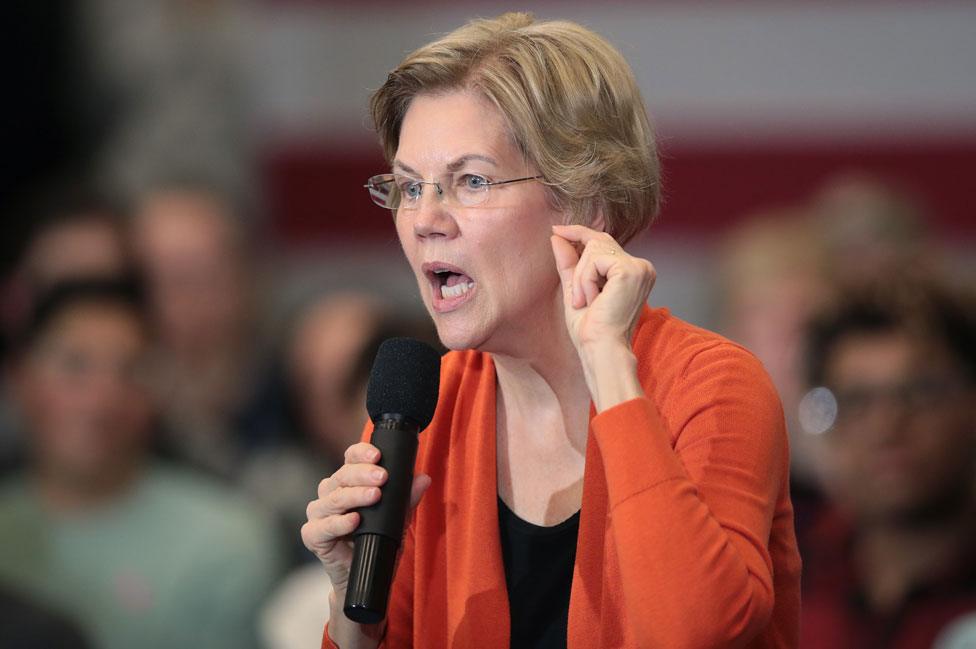
Elizabeth Warren is fighting for the progressive Democratic vote
Earlier on Sunday, at a Klobuchar event about 40 miles (65km) away in the small town of Perry, Nancy Hanaman had the opposite take. She said she was supporting either Warren or Sanders - and giving Klobuchar only a courtesy look - because the moderate, pragmatic candidates could cede too much ground to the Republicans.
"If you start out far enough on the left, then maybe you can get something you like," she said. "If you start in the middle, you'll get nothing."
The big, bold vision versus moderate practicality debate has played itself out for months within the Democratic Party, on topics from healthcare, to the environment, to affordable college education and taxes.
The crisis in Iran, which could pit long-time anti-war candidates like Sanders against Biden, who backed the 2003 Iraq War, may be the latest illustration of this political fault line.
The division between the candidates is not always clear, though. Some Biden supporters list Sanders as their second choice. There are Warren backers who say they could switch to Buttigieg.
It's a recipe for a frenzied few weeks as the candidates - many of whom have been on the campaign trail for more than a year - try to put themselves in the best position.
With more than half of Iowa Democrats saying they could still change their minds - and a system that allows supporters to switch sides at the caucus site if their candidate doesn't have enough support - the outcome is far from determined. And there's no guarantee that the winner of Iowa will go on to win the nomination.
Still, it's better to win Iowa than to lose it.
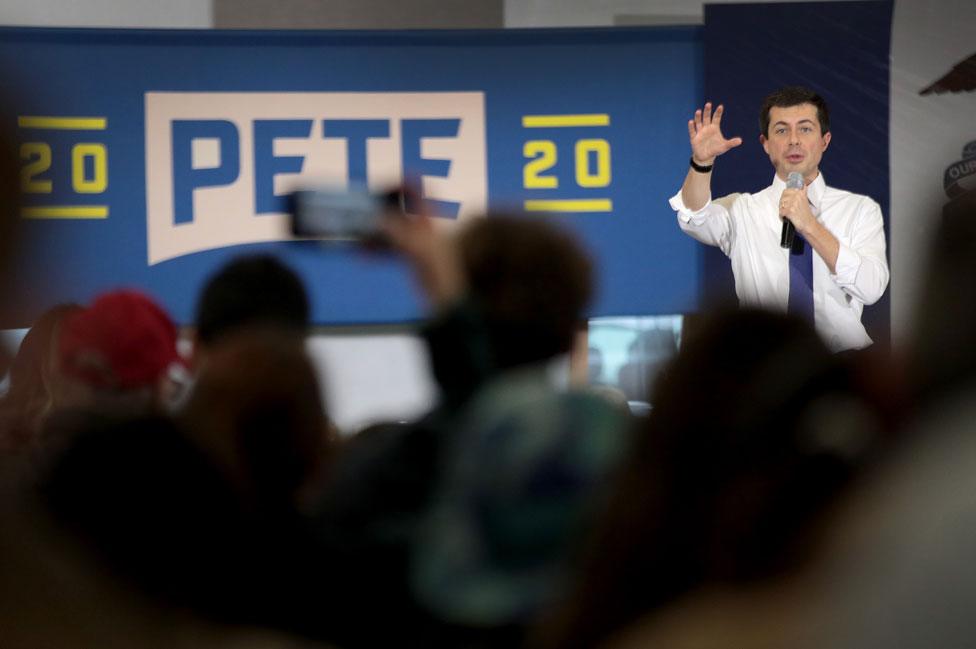
Pete Buttigieg slid from a surprise lead in Iowa polling
Progressive unrest
The high stakes could account for what appeared to be growing friction between the Warren and Sanders campaigns over the past few days. A showdown between those two stars of the progressive movement has long been predicted, but the unstated non-aggression pact between the two had held fast, until now.
The spat started with a Politico report, external on Sunday of a Sanders canvassing script that addressed how to deal with supporters of other candidates. It suggested volunteers tell prospective Warren voters that their candidate's backing was confined to affluent liberals who were reliably Democratic. The script said Warren, unlike Sanders, had been unable to expand her base.
Warren responded to the reports by saying she was "disappointed" that the Sanders side would "trash" her, warning that the party couldn't return to the acrimony of the 2016 primary race between Sanders and Hillary Clinton - a sore subject for many Clinton voters.
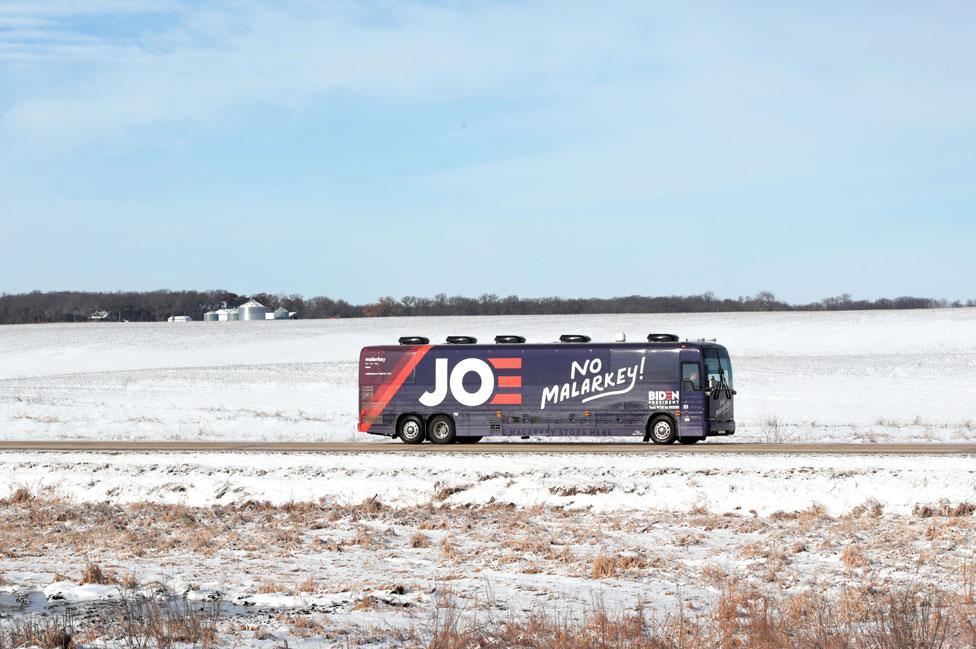
Joe Biden's 'No Malarky' bus makes its way across Iowa. Biden is leading the national polls
Then on Monday, CNN reported, external that during a private December 2018 meeting between Sanders and Warren, Sanders told her that a woman couldn't beat Trump. Sanders vehemently denied the story, but Warren issued a statement essentially confirming it. "I thought a woman could win," she wrote, external. "He disagreed."
It's the first real blood between the two progressive candidates, and it could spill on to the stage on Tuesday night when the top six Democratic hopefuls debate for the last time before the Iowa caucuses.
The tension between Warren and Sanders has left some progressives concerned that both could be weakened in the end.
"Bernie Sanders and Elizabeth Warren, you both are progressive champs and our movement needs to see you working together to defeat your corporate Dem opponents - not attack each other," Democracy for America, a left-wing group, tweeted on Monday, external. "Progressives will win in 2020, but only if we don't let the corporate wing or Trump divide us."
Impeachment trial dilemma
Even if Sanders and Warren both choose to take the high road, the conflict between their two campaigns could fester - particularly because both candidates are almost certain to end up tied to Washington for at least the next few weeks, as Trump's Senate impeachment trial seems likely to begin as early as next Tuesday.
According to reports, Republican Senator Mitch McConnell is planning for the trial to run six days a week for three to five weeks, which means the two Democratic candidates - along with Klobuchar and Michael Bennet, who is also still running for president - will be off the campaign trail and serving as "jurors" in the Senate chamber for long stretches of time.
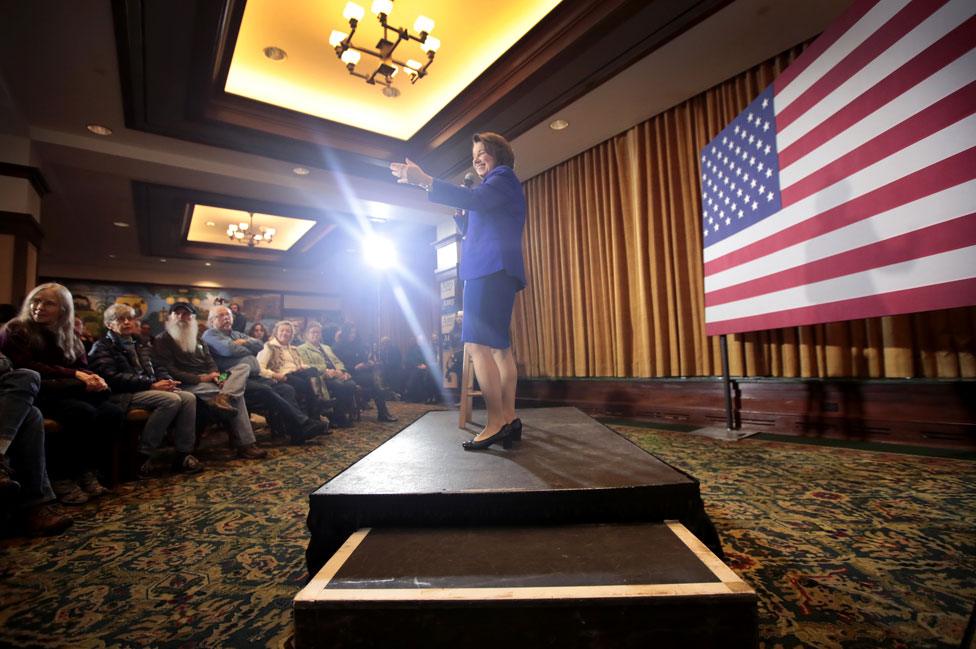
Amy Klobuchar addressing supporters at a town hall meeting in Iowa
The trial was cited by New Jersey Senator Cory Booker as one of the reasons why he ended his presidential bid on Monday. The challenge facing even candidates who are doing well in the polls is formidable.
Julie Kennedy, Klobuchar's deputy national political director, said on Sunday that her campaign would have to rely on surrogates and on-the-ground organisation in Iowa and other early states during the process, while the senator participates in virtual town halls and other events from Washington.
Sanders has hinted that he could still travel in the evening after trial days to places like New Hampshire and South Carolina for campaign events.
It's far from an optimal situation, as candidates like Biden, Buttigieg and Andrew Yang will have the field to themselves, but it's the only move the senators have.
Tweeting from the sideline
Meanwhile, many Democrats must feel as though Trump looms over the campaign like an unblinking eye of Sauron - always watching; always tweeting.
The president has directed four tweets at his Democratic rivals since Sunday - mocking Booker for dropping out of the race, offering derisive nicknames for Warren and Michael Bloomberg and attempting to fan the flames of discord between Warren and Sanders.
"Elizabeth is very angry at Bernie," he wrote. "Do I see a feud brewing?"
The president, who faces no real challenge to his re-nomination from within his own party, will have months to live-tweet the Democratic race, lobbing barbs and insults from the comfort of the White House. Sometimes he will deliver his message in person - his campaign just announced that he will travel to Des Moines the Thursday before the caucuses to hold a rally.
"I just want him to sit down and shut up," said an exasperated Chris Henning, the chairman of the Greene County, Iowa Democrats, on Sunday. Even if everything were to go Henning's way, and the Democratic nominee prevail in November's general election, she will still be waiting more than a year for her wish to come true. But in just three weeks in Iowa, that long political journey finally gets under way.
Who will take on Trump in 2020?

- Published2 March 2020
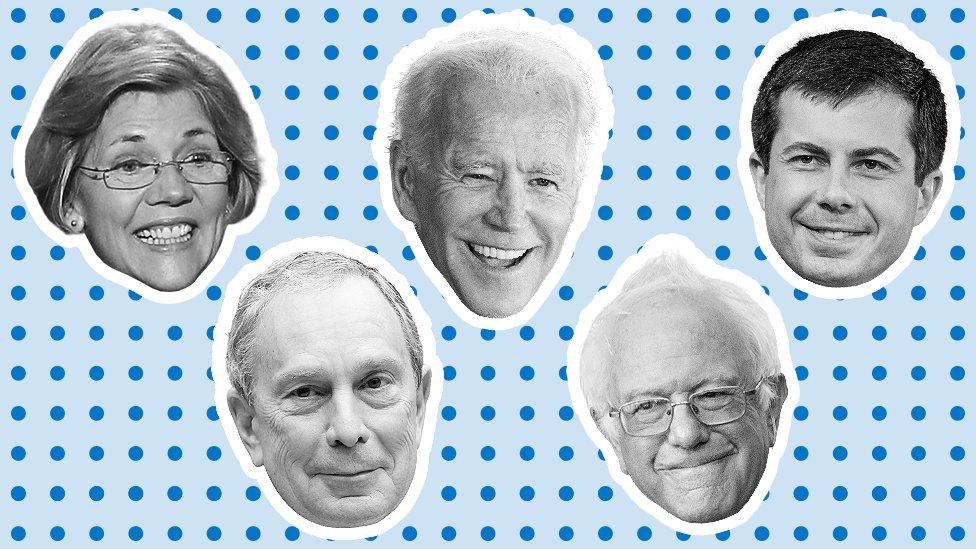
- Published4 February 2020
